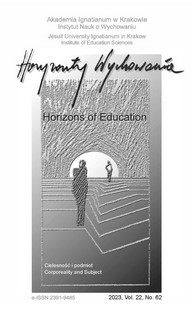Mine or Alien? The Experience of Body and Corporeality in Sudden Vision Loss
Mine or Alien? The Experience of Body and Corporeality in Sudden Vision Loss
Author(s): Kornelia CzerwińskaSubject(s): Individual Psychology, Cognitive Psychology, Comparative Psychology, Personality Psychology, Psychology of Self, Psychoanalysis, Health and medicine and law
Published by: Uniwersytet Ignatianum w Krakowie
Keywords: body; corporeality; disability; vision loss; adaptation;
Summary/Abstract: RESEARCH OBJECTIVE: The goal of the article is to describe the specific perceptions of corporeality of an adult who experiences sudden loss of vision. Special emphasis is put on the process of creating a new representation of one’s body. THE RESEARCH PROBLEM AND METHODS: The text focuses on the issues of deconstructing one’s self-image due to the change in experiencing one’s body, temporary incapability of performing daily activities, and problems with avoiding pain and discomfort. A literature search and analysis were conducted. THE PROCESS OF ARGUMENTATION: The main consequences of vision loss in adulthood are presented. A process of creating a new representation of one’s own body is described in reference to the concept of the stages of adjustment to vision loss. RESEARCH RESULTS: When comparing the current appearance and functionality of their body to the situation from before vision loss, persons with acquired vision impairment have a sense of alienation of their body. Along with the loss of vision as a basic cognitive tool, they experience disintegration of their physical “self,” loss of confidence in their other senses, and overall bodily inadequacy. The negative approach to their own corporeality tends to be reinforced by reactions of other people. CONCLUSIONS, INNOVATIONS AND RECOMMENDATIONS: The attitudes and emotions towards one’s body influence the dynamics of adjustment to vision loss, including the motivation of a blind person to actively participate in the rehabilitation process. Psychological rehabilitation should support a person who is losing vision in deconstructing the corporeal ‘self’ and reintegrating a new body image. The issue of the changing body image in the situation of sudden vision loss in adulthood has not been sufficiently researched. There is a need to undertake studies focused on this issue.
Journal: Horyzonty Wychowania
- Issue Year: 22/2023
- Issue No: 62
- Page Range: 53-62
- Page Count: 10
- Language: English

